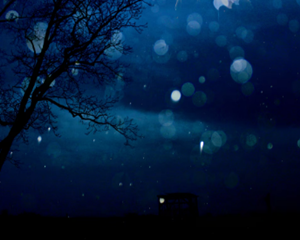"It's fairly accepted that the trigger is a short photoperiod -- the number of hours from dawn to dusk," says Rohan. "It's the strongest predictor of when the symptoms begin."
“人們普遍認為觸發(fā)因素是短光周期--從黎明到黃昏的小時數(shù),”羅漢說。“這是癥狀何時開始的最強預(yù)測因素。”
But why, exactly, does less daylight seem to make some people clinically depressed?
但到底為什么日光不足看起來會讓某些人出現(xiàn)臨床抑郁癥呢?
"That's the million-dollar question," says Rohan.
“這是一個價值百萬美元的問題,”羅漢說。
One leading theory is that the change in daylight disrupts our bodies' release of melatonin, a hormone the brain releases every night to promote sleep.
一個主要理論是,日光的變化會擾亂我們身體褪黑激素的釋放,褪黑激素是大腦每晚釋放的一種促進睡眠的荷爾蒙。
The process is part of our circadian rhythm, our innate biological clock dictating when we sleep and wake.
這個過程是我們晝夜節(jié)律的一部分,我們的先天生理時鐘決定了我們何時睡覺和醒來。
Our clocks are cued up by morning light, but as the supply of daylight dwindles in winter, melatonin may be released later and wear off later, the theory suggests.
該理論表明,我們的生理時鐘是通過晨光來調(diào)動的,但隨著冬季日光供應(yīng)的減少,褪黑激素可能會較晚釋放并逐漸消失。
That means, "that alarm clock might be going off in the morning, but the body is still in a state of biological night," says Rohan.
這意味著,“鬧鐘可能會在早上響起,但身體仍處于生物夜間狀態(tài),”羅漢說。

Those diagnosed with SAD may be particularly sensitive to schedules that disrupt their circadian rhythm by beginning and ending at odd hours, like shift work, she adds.
她補充說,那些被診斷患有季節(jié)性情感障礙的人可能對在奇怪的時間開始和結(jié)束的日程安排特別敏感,例如輪班工作,從而擾亂了他們的晝夜節(jié)律。
Even given that theory, she says it's still unclear why disrupted circadian rhythm can lead to depression, instead of just feeling fatigued.
她表示,即使考慮到這個理論,目前仍不清楚為什么晝夜節(jié)律紊亂會導(dǎo)致抑郁,而不僅僅是感到疲倦。
Rohan says a minority of people who experience SAD in the winter can become manic in the summer when the number of stimulating daylight hours increases.
羅漢說,少數(shù)在冬天經(jīng)歷季節(jié)性情緒失調(diào)的人在夏天,當(dāng)刺激的白天時間增加時,可能會變得躁狂。
But still others experience a phenomenon called summer SAD, or when seasonal depression symptoms occur only in the summer -- perhaps triggered by the heat and humidity.
但還有一些人經(jīng)歷了一種稱為夏季SAD的現(xiàn)象,即季節(jié)性抑郁癥癥狀僅發(fā)生在夏季--可能是由炎熱和潮濕引發(fā)的。
Instead of feeling lethargic, summer SAD patients more often feel irritable and agitated.
夏季SAD患者不會感到昏昏欲睡,反而更容易感到煩躁和不安。
Scientists are studying whether temperatures rising as a result of climate change may harm mental health.
科學(xué)家正在研究氣候變化導(dǎo)致氣溫上升是否會損害心理健康。
A 2018 study of mood expressed on social media found depressive language increased with temperature.
2018年對社交媒體上表達的情緒進行的一項研究發(fā)現(xiàn),抑郁性語言會隨著溫度的升高而增加。












